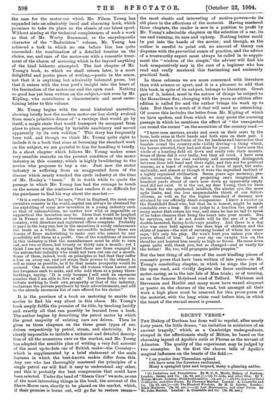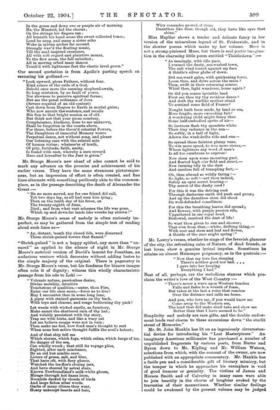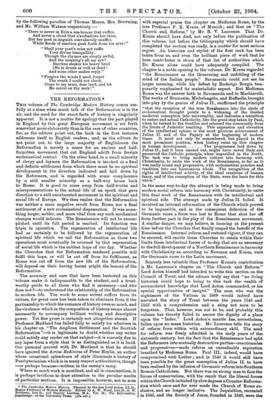charming legend of Apollo's exile at Pherae as the servant
of Admetus. The quality of the experiment may be judged by two examples. In the first the chorus tells of Apollo's magical influence on the beasts of the field :—
" I on yonder dear Thessalia' n upland Oft have seen the foresters enchanted, Many a spangled lynx and leopard, many a glancing antler, * (1) Imitations and Translations. By H. C. G. Moule, Bishop of Durham. London : Seeley and Co. [2s. 6d. net]—(2) To Leda, and other Odes. By T. Sturge Moore. London: Duckworth and Co. [Is. net.]—(3) Tho Legend of Saint Frideswide, and other Poems. By Florence Hayllar. London A. Constable and Co. [2s. 6d. net.] (4) The Hundred Windows. By H. D. Lowry. London : Elkin Mathews. [Ss. 6d. net.]—(5) Lost Masterpieces, and other Verses. By
Bt. John Hankin. London : A. Constable and Co. [3s. 6d. net.] On the strings his fingers ran ;
All beneath his hand arose the sweet collected tones ; Loud he sang, and many a sister echo
Woke in sylvan arches far around.
Strongly wav'd the floating music, Till the mad inspired creatures, All with soft regard and plaintive moans, To the flow arose, the fall subsided ; All in moving orbed mazy dances Touch'd with lightsome feet the elastic level green."
Our second quotation is from Apollo's parting speech on resuming his godhead
Look upward, pious Fathers, without fear.
Kind solace of the exile of a God, Behold once more the seeming shepherd-swain, So long mistaken, by no fault of yours, Nor slowness to perceive spiritual forms; But me the penal ordinance of Jove (Severe requital of an old contest) Cast down from Heaven to Earth in mortal guise ; Who now annuls the-sentence, and recalls His Son to that bright session as of old.
But think not that your pious courtesy, Complaisance, kindness, done to me unknown, Shall be forgotten in the courts above.
For there, before the thron'd celestial Powers, The Daughters of immortal Memory weave Perpetual dance, not without song, and please Our listening ears with the related acts Of human virtue; whatsoe'er of truth, Of pity, fortitude, faith, amity, Is found with men, whereby a sure reward Here and hereafter to the Just is given."
Mr. Sturge Moore's new sheaf of odes cannot be said to mark any advance on the promise and achievement of his earlier verses. They have the same strenuous picturesque- ness, but an impression of effort is often created, and fine lines alternate with something perilously akin to the common- place, as in the passage describing the death of Alexander the Great :- " He no more moved, nor for one friend did call,
Yet two days lay, as all had seen him lying ; Then on the tenth day of his fever, on
The-twenty-eighth of June,
Died ; and from what vast schemes the life was gone, Which up and down far lands like wrecks lay strewn !"
Mr. Sturge Moore's sense of melody is often curiously im- perfect, as may be gathered from the simple test of reading aloud such lines as-
" Ay, distant, 'neath thy closed lids, were discerned Those shriek-pulsed towers that flamed."
4' Shriek-pulsed " is not a happy epithet, any more than " un- eared " as applied to the silence of night in Mr. Sturge Moore's metrical version of David's lament for Jonathan, an audacious venture which decorates without_ adding lustre to the simple majesty of the original. There is pageantry in Mr. Sturge Moore's verse, but his fondness for bizarre images often robs it of dignity ; witness this wholly characteristic passage from his ode to Loki
Volcanic nature, passionless desire, Divine mobility, intuitive Touchstone of qualities,—enter, thou Fire, Enter our life once more,—force us to live !
May I encounter thee in some long lane, A gipsy with stained garments on thy back, With toys and charms, and songs bedizening thy pack !
Let weeds with wicked smells, as fumitory, Make smart the shattered ruin of thy hat ; And volubly persistent with thy story, Trap me with hints, and like a wary cat Let me believe escape were not in vain; Then make me feel, how fond man's thought to rest When none but active thought fulfils the soul's behest ;
And of that ship tell me
Which storms, which fogs, which calms, which bergs of ice, No danger of the sea, Can wholly wreck ; that still its voyage plies, Righted, after each mischance, By an old but nimble crew, Lovers of green, salt, and blue, That have oft, with fiery glance, Watched the ice-floe's closing jars, And have steered by astral stars, Known Newfoundland's milk-white gloom, Mirage through hot hazes loom, Noontide darted by clouds of birds And large fishes utter words.
Garbs of many climes they wear, Hoary unkempt beards and hair, Dauntless like thee, though old, they have like eyes that shine."
Miss Hayllar shows a tender and delicate fancy in her version of the miraculous legend of St. Frideswide, and in the shorter poems which make up her volume. Hers is not a strong-pinioned Muse, but there is real poetic imagina- tion in the charming little poem entitled "Thistledown" "As musingly, with idle pace,
I roamed the dusty, sea-washed town, The salt wind tossed against my face A thistle's silver globe of down.
Did sea-ward gales, with quickening force, Loose thee, and drive across the main ? Then, swift in their returning course, Whirl thee, light wanderer, home again ?
Or did yon scarce invisible land First see thee try thy reckless dance ? And doth thy warlike mother stand To sentinel some field of France ?
Nought hath been made, by land or sea, More fragile, more exceeding fair! A wondering child might fancy thee Some half-embodied sprite of air—
So lustrous flash thy spearlets white Their tiny radiance in the sun— So softly, in a ball of light,
Adown the wind-drifts ride and run—
So spread these faintest plumy vans, To win more speed, to woo more stress,— Whose lightness any word of man's Is all too cumbrous to express !
Now risen upon some mounting gust, And floated high o'er field and street,— Now turning idly in the dust
And careless fall of trampling feet,—
Oh, thus abroad so wildly faring !- So light, so soft !—art thou indeed, Safely an open secret bearing— Thy secret of the dusky seed?
For this it was the delving root Through darksome earth did push and press ; And up the dauntless stem did shoot Its well-defended comeliness.
For this the breathing leaves did spread ; And flowers, with purple passion rife, Upgathered in one royal head, Bestowed, received the dust of life!
So west thou given to sun and shower ; That e'en from thee,—white. drifting thing,— With root and stem and leaf and flower, A thistle of the race might spring !"
Mr. Lowry's verses, whether be sings of the feverish glamour of the city, the refreshing calm of Nature, of dead friends, or lost loves, show a genuine lyrical impulse. Sometimes he attains an almost Heinesque poignancy, as in the quatrain
Now that my love lies sleeping There's neither good nor bad.. , I gave into her keeping Everything I had."
Beet of all, perhaps, are the melodious stanzas which pro-
claim the writer's love of the West Country
There's never a wave upon Western beaches Falls and fades to a wreath of foam, But takes at the last a voice that reaches Over the distance and calls me home.
And you, who love me, if you would know me
Come away to the Western sea, The land that did make shall take and show me Better than that I have seemed to be."
Simplicity and melody are rare gifts, and the double endow- ment lends real charm to these excursions down " the starlit street of Memories."
Mr. St. John Hankin has lit on an ingeniously circumstan- tial device for introducing his " Lost Masterpieces." An imaginary American millionaire has purchased a number of unpublished fragments by various poets, from Burns and Byron down to Mr. Kipling and Mr. William Watson, selections from which, with the consent of the owner, are now published with an appropriate commentary. Mr. Rankin has a facile pen and a considerable gift of literary mimicry, but the temper in which he approaches his exemplars is void of good humour or geniality. The victims of James and Horace Smith and of Calverley in many cases were able to join heartily in the chorus of laughter evoked by the travesties of their mannerisms. Whether similar feelings could be awakened by the present volume may be judged
"There is never in Erin a sea-breeze that ruffles, And never a cloud that o'ershadows her skies, But her poet in anguish convulsively snuffles While floods of emotion gush forth from his eyes !"
" Shall your poet's cries not ruffle Your divine tranquillity. Though the rhymes are simply awful, And the meaning's all my eye P Bacchus shakes his heavy head (He is drunk as well as dead !
And none other makes reply."
"Forgive the words I used, forget The wrath I could not check, Come to my arms, dear land, and let Me snivel on thy neck !"
THE REFORMATION.*












































 Previous page
Previous page